How to Respond to Negative Patient Reviews (Examples Included)
So many businesses and healthcare organizations alike are afraid of allowing anyone to review their services because they fear negative reviews. That’s understandable but they aren’t the end of the world.
.avif)
People look at online reviews before choosing to use goods or services, and healthcare isn’t an exception. Of those viewing health information online, 42% are looking at health-related reviews.
Reviews can be so helpful for getting new patients into your organization. They’ll see what your practice is doing well and feel more comfortable with making their decision to visit you. But things aren’t always perfect and some patients will get frustrated with their experience.
So many businesses and healthcare organizations alike are afraid of allowing anyone to publically critique their services because they fear the repercussions. That’s understandable but they aren’t the end of the world.
In fact, negative feedback actually makes you look more credible. A study in 2013 found that 68% of people trust reviews more when they see both good and bad scores.
Even with that statistic in mind, let’s say you open up your practice to receiving reviews. What’s the best way to soften the blow of a negative one? All you have to do is respond.
Here are 10 tips for responding to negative patient reviews.
Respond and Do it Early
Patients who are leaving negative reviews will usually do it soon after their poor experience. What they just experienced is still fresh in their mind, so they feel more inclined to leave a bad review.
Ignoring the reviews altogether is not an option. Doing so makes it seem like your organization is neglecting to handle its mistakes. You want other viewers to know that you prioritize experiences, want to improve them, and are willing to do what it takes to mend any issues that arise.
For each example provided within this article, I’ve redacted the names of each individual and organization.
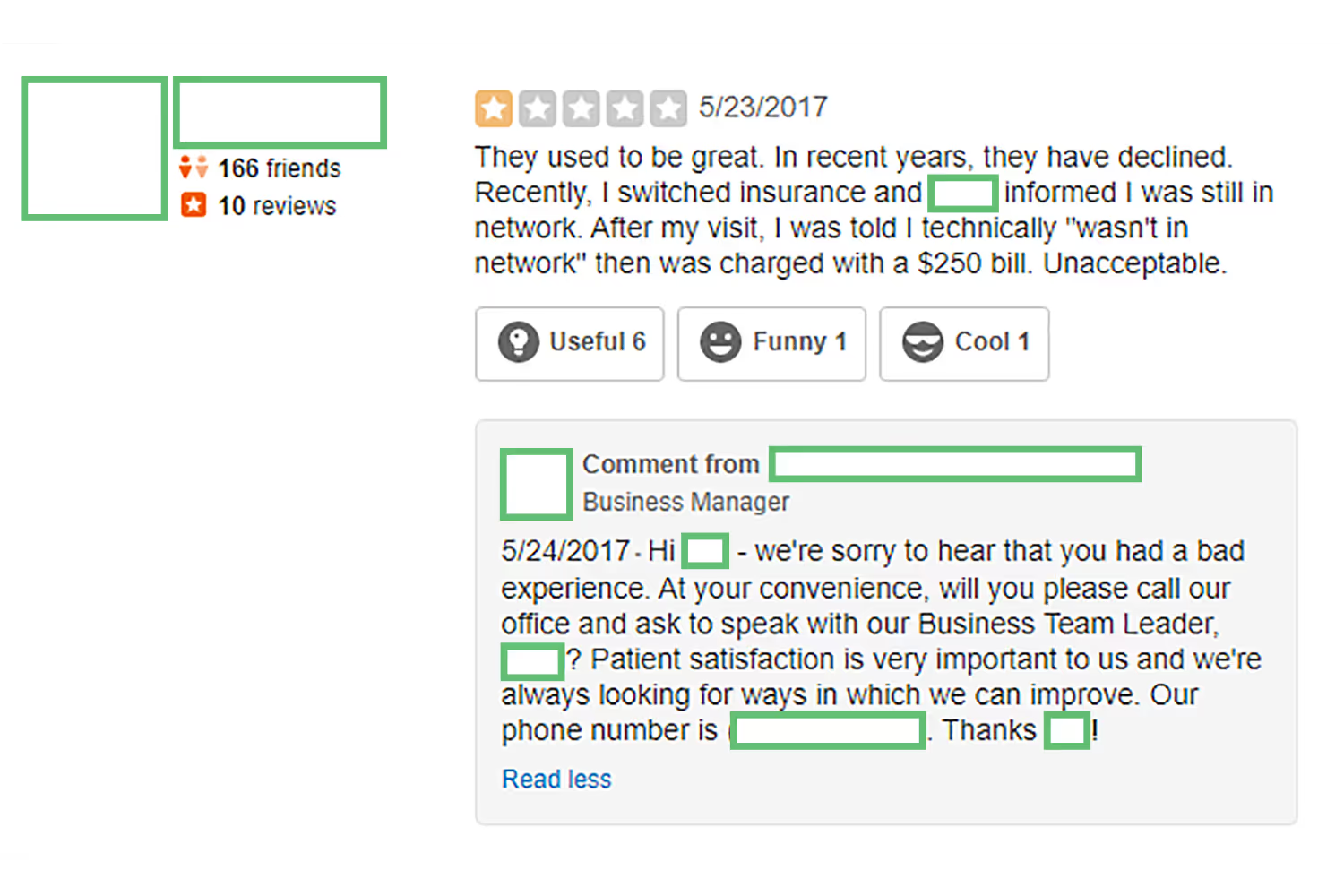
Our first example of a great response to a bad rating shows exactly what I just mentioned.
The patient vented their frustrations regarding a mix up with their insurance. Within 24 hours, the business manager at the practice responded to it. The response is personable throughout by referencing the patient’s first name and by providing the name of the team member the disgruntled should contact.
Apologize and Have Sympathy
In your response, you should acknowledge the issue and apologize for it. Even if they’re unreasonable or it isn’t your practice that’s at fault, an apology shows that you care. It won’t only be meaningful to the patient, but it’ll send a positive message to others who look at your practice’s reviews.
After all, showing genuine sympathy in an apology from a business after something has gone wrong increases satisfaction by 74%.
Showing sympathy for negative ratings shows that you care about what others are going through. It demonstrates that you genuinely want to help since these issues shouldn’t happen. Showing that your sympathy lets patients know that you prioritize their care while fixing any other mistakes along the way.
Offer an Explanation
This doesn’t mean make an excuse for whatever happened. But sometimes, there are legitimate reasons that upset a client. Providing these makes the patient and future readers aware that you looked into the problem so it gives context as to what happened.
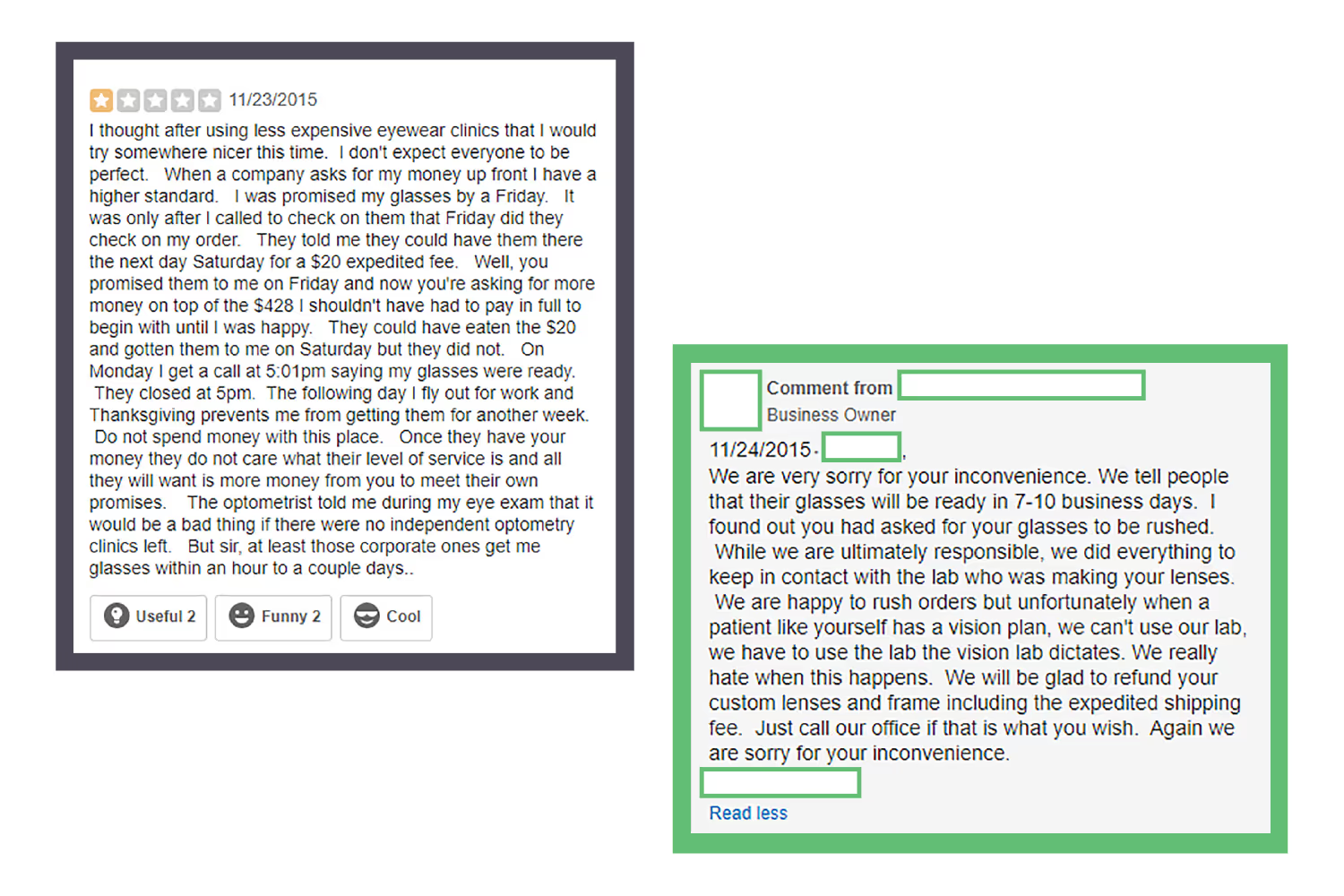
Our second example within this blog shows a response by an ophthalmologist to a negative review. In this case, they had to explain what happened from their end. It’s a good example of this scenario because the business owner collaborated with his team to determine what happened, took the blame for the mistake, and explained why the situation happened the way that it did.
If there’s an explanation for the problem, then that means you plan to fix it should it arise in the future.
Don't Use Canned Responses
If you reply to all of your reviews, you’re ahead of the game. However, if you’re responding to each of them using a templated response, you’re making a big mistake.
That’s because it’s not authentic.
In this instance, it doesn’t matter what type of feedback you receive. If you use canned replies to all of your reviews, users who read them won’t think you take your clients seriously. In their eyes, why should they visit you?
Scripted empathy is transparent. People have had the ability to leave public feedback on businesses for over a decade. During that time, they’ve read thousands of reviews and responses. In other words, they’re conditioned to know when a response from a business owner or employee isn’t genuine.
Sending a personal message, on the other hand, proves that you take all comments and concerns seriously. It emphasizes that you take any poor experiences to heart and go out of your way to correct them.
It also shows appreciation for those users who’ve taken the time to write good reviews.
Don't Get Personal
Always keep your cool when responding to negative comments. Yes, in some cases, they might be over-dramatic. You might worry that you’ll lose other patients or potential customers. Or, you’ll be so upset that someone criticized your hardworking team.
But don’t get personal. Even if they attack you and your character, it isn’t about you as an individual. They’re venting their frustration. It’s about acknowledging their experience, correcting the issue, and ensuring it doesn’t happen again. So don’t retaliate because that will make other clients think that you only care about your image and don’t care about improving their experiences.
Whatever you do, don’t bring up their personal information in your response. Some negative reviews responses in the past led to HIPAA violations because doctors used PHI to defend themselves. Even if the patient posts negative information about your practice, you can never break their right to privacy.
Take it Offline
Sometimes it can be difficult to break through to your patients in an online setting. They might still be furious and, even if you respond with care, they may still fire back. You don’t want the conversation to turn into them trying to fight with you, especially on a public forum.
Let them know that you’d like to remedy the situation and that they should contact your office so that you can get more information. Alternatively, you could also solve it with them through direct messaging (also referred to as DMs) if the negative review happened on a social media channel like Twitter. You can’t discuss PHI online anyway, so you’d want to talk to them personally about details.

Our third example shows a dentist’s office perfectly maneuvering itself around a negative patient review without compromising the individual’s privacy. Within the first couple of paragraphs, they respond to the critique in a thoughtful, genuine way. Then, in the last paragraph, they cite that they will not provide any further details on the procedure that the patient received due to HIPAA regulations.
Say Thank You
This one might sound a little strange.
Why would you thank a patient if they criticize you? You don’t want your name dragged through the mud, so what could you possibly be thankful for?
Well, you want them to know that you appreciate their honesty. Customer feedback helps you improve your organization as a whole. As you learn from each critique and adjust to them, these bad interactions won’t be as consistent.
If patients always have the same bad experience, you’ll lose them. But when they’re specific and let you know what they didn’t enjoy, that’s information you can use to improve future visits.
Thanking them informs them that you take each response into consideration.
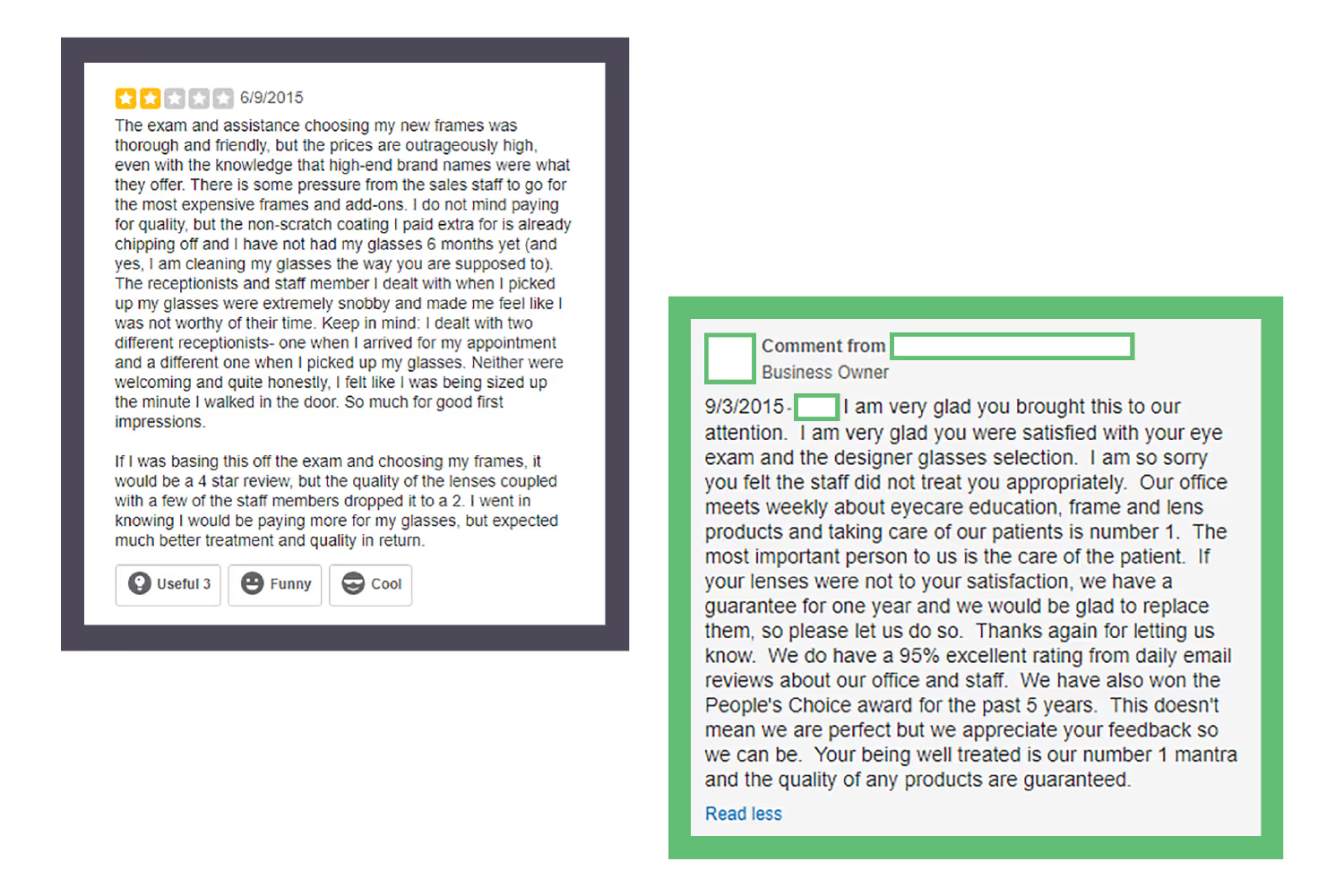
In our fourth sample, a disgruntled client mentions how they felt mistreated by the staff during their visit to an eye doctor. The organization’s response thanks the patient for their review in four separate instances. With a reply written this well, it’s hard for anyone to continue to stay angry or escalate the issue further.
Don't Ask Them To Delete
One bad review is enough to cause prospective clients to question your practice. But having only perfect ones isn’t authentic.
In fact, 95 percent of consumers suspected foul play or censorship when there aren’t any bad reviews. No matter how awesome your practice is, no company is ever perfect. If you don’t have anything negative written about you, people will question your legitimacy.
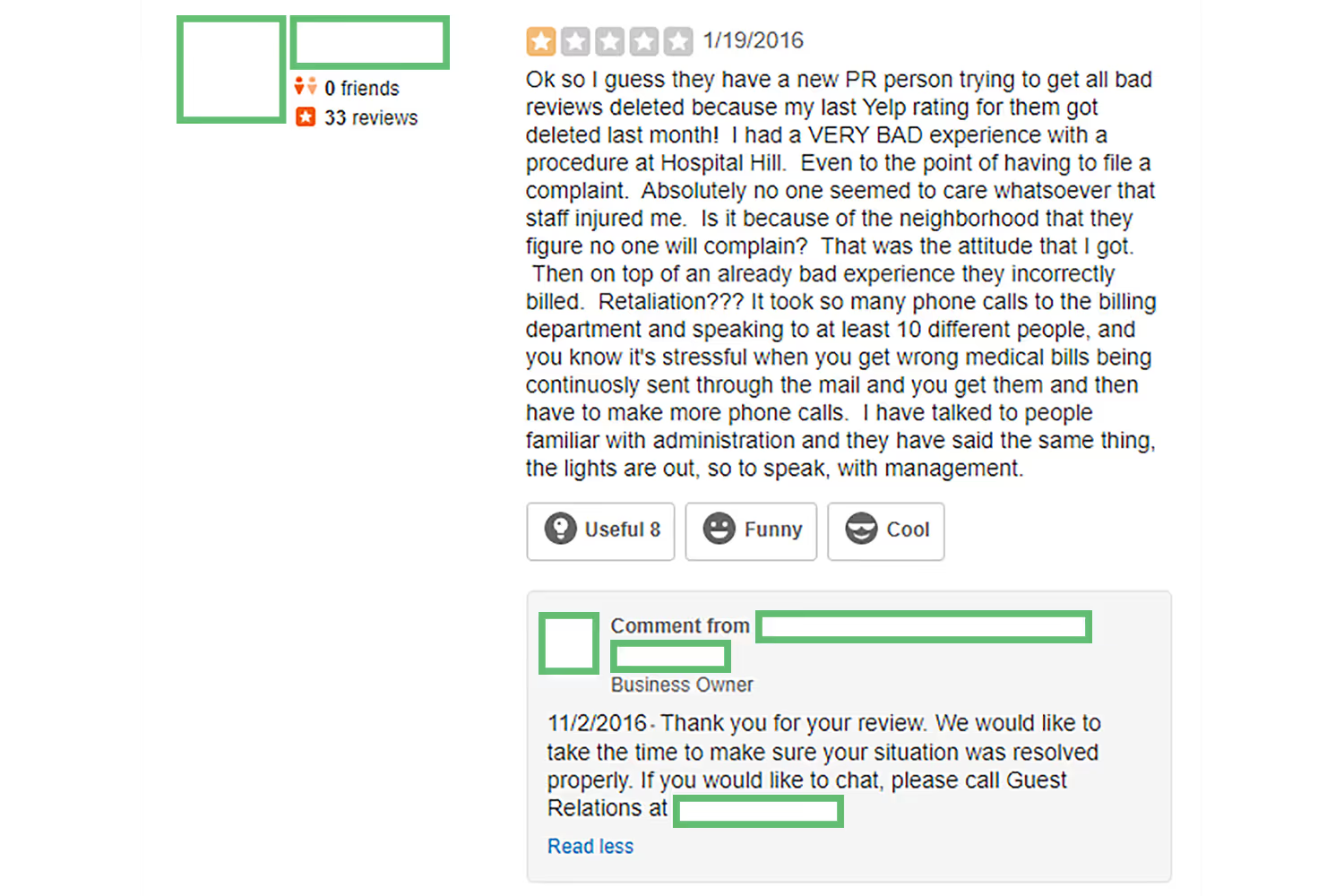
Our fifth example introduces an interesting scenario. In this case, the patient accused the healthcare organization that they deleted their responses. I don’t know whether or not the organization did but it’s important to note that review websites place restrictions on posts in order to combat fake ones. Regardless, what makes it a good example is that the organization didn’t delete this accusation. Instead, they handled it.
Asking someone to delete a negative comment only adds more fuel to the fire. It appears deceiving and you’ll seem dishonest. Not to mention, it makes your organization look weak if it becomes known.
Sometimes, bad experiences happen and there’s nothing to do but try to improve for the future. There’s also a chance that if you remedy the situation and handle it appropriately, the patient might remove their post afterward. But even if they don’t, other customers will see that you cared about the patient enough to try to make things right.
Follow Up Directly or Privately
When you respond to a review, you might get a quick response. It could be positive or negative. But sometimes, the patient won’t respond. Maybe they…
- Didn’t care enough to watch for your response
- Were still too upset about the situation
- Gave up in pursuing the issue further
Whatever the case may be, you should follow up with the patient. Ask them if the situation got resolved for them or if there’s anything you can still do to help (within reason, of course). You can do this publicly if you know you resolved the issue. Or you can take it to direct messages if you’re not sure of the issue’s status.
Offer Compensation When Necessary
In some situations, compensation might be appropriate. If the patient’s condition wasn’t resolved or they’re experiencing complications, compensation might be necessary.
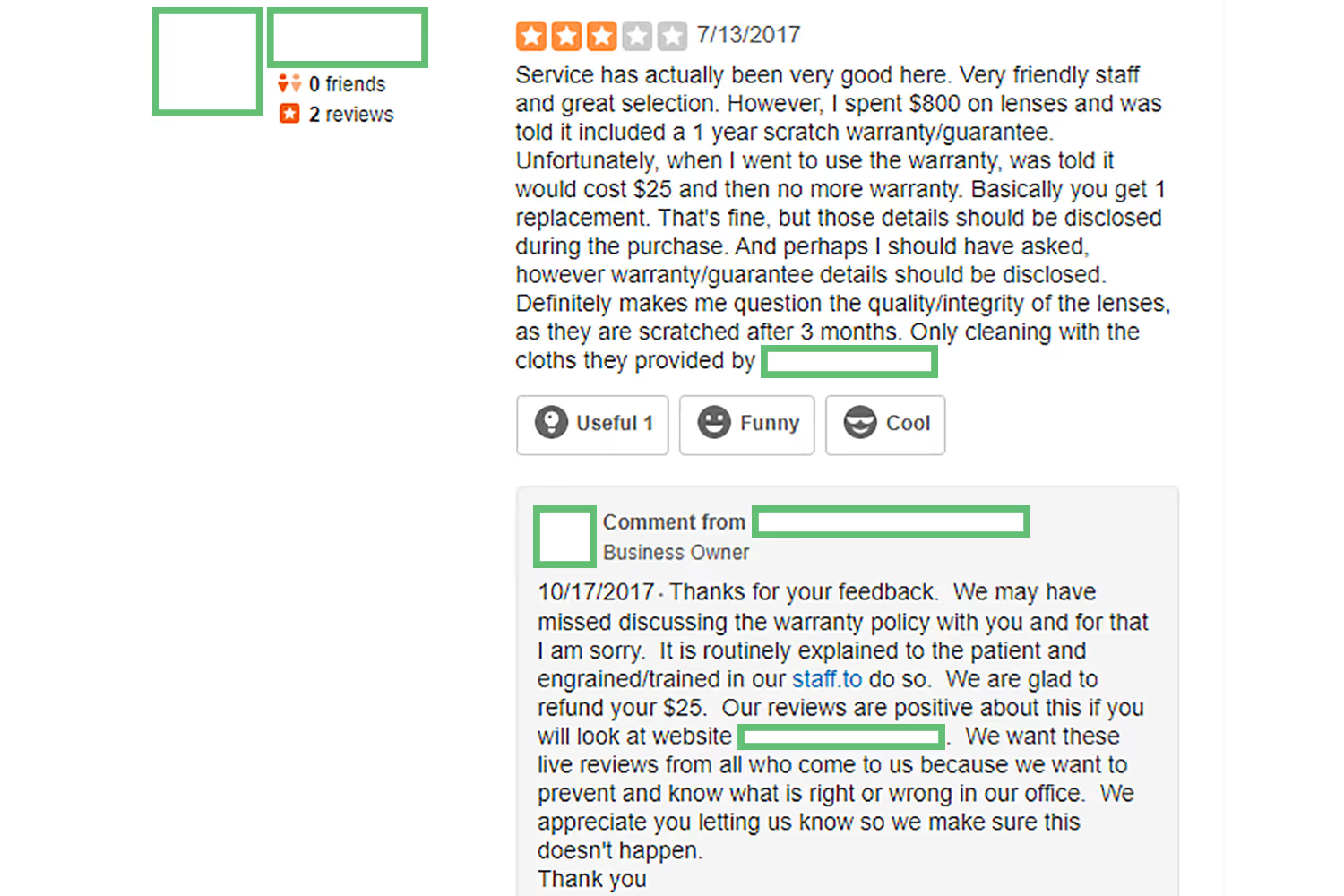
Our sixth example of a response to negative patient reviews shows this unique scenario. In healthcare, giving compensation to a patient doesn’t happen as often as it would in the commercial space. However, for an organization like an eye doctor, that provides lenses to patients, compensation might be the appropriate response.
In any case, consider options, discuss with your team and work through this scenario with the patient.
Conclusion
While it would be nice to only have glowing 5-star reviews, it’s unrealistic. You can’t please everyone, and sometimes things happen out of your control that cause unfortunate experiences.
When patients feel strongly about these interactions, they’ll leave negative reviews.
But the way that you handle these poor reviews can show that your organization is still reliable. It demonstrates you care for the patient, value their feedback, and want to correct the issue. This will prove that your practice will make the effort to improve in the future to limit more negative experiences from occurring. If you handle them correctly, you’ll get better results than you expected.
Emphasize your product's unique features or benefits to differentiate it from competitors
In nec dictum adipiscing pharetra enim etiam scelerisque dolor purus ipsum egestas cursus vulputate arcu egestas ut eu sed mollis consectetur mattis pharetra curabitur et maecenas in mattis fames consectetur ipsum quis risus mauris aliquam ornare nisl purus at ipsum nulla accumsan consectetur vestibulum suspendisse aliquam condimentum scelerisque lacinia pellentesque vestibulum condimentum turpis ligula pharetra dictum sapien facilisis sapien at sagittis et cursus congue.
- Pharetra curabitur et maecenas in mattis fames consectetur ipsum quis risus.
- Justo urna nisi auctor consequat consectetur dolor lectus blandit.
- Eget egestas volutpat lacinia vestibulum vitae mattis hendrerit.
- Ornare elit odio tellus orci bibendum dictum id sem congue enim amet diam.
Incorporate statistics or specific numbers to highlight the effectiveness or popularity of your offering
Convallis pellentesque ullamcorper sapien sed tristique fermentum proin amet quam tincidunt feugiat vitae neque quisque odio ut pellentesque ac mauris eget lectus. Pretium arcu turpis lacus sapien sit at eu sapien duis magna nunc nibh nam non ut nibh ultrices ultrices elementum egestas enim nisl sed cursus pellentesque sit dignissim enim euismod sit et convallis sed pelis viverra quam at nisl sit pharetra enim nisl nec vestibulum posuere in volutpat sed blandit neque risus.

Use time-sensitive language to encourage immediate action, such as "Limited Time Offer
Feugiat vitae neque quisque odio ut pellentesque ac mauris eget lectus. Pretium arcu turpis lacus sapien sit at eu sapien duis magna nunc nibh nam non ut nibh ultrices ultrices elementum egestas enim nisl sed cursus pellentesque sit dignissim enim euismod sit et convallis sed pelis viverra quam at nisl sit pharetra enim nisl nec vestibulum posuere in volutpat sed blandit neque risus.
- Pharetra curabitur et maecenas in mattis fames consectetur ipsum quis risus.
- Justo urna nisi auctor consequat consectetur dolor lectus blandit.
- Eget egestas volutpat lacinia vestibulum vitae mattis hendrerit.
- Ornare elit odio tellus orci bibendum dictum id sem congue enim amet diam.
Address customer pain points directly by showing how your product solves their problems
Feugiat vitae neque quisque odio ut pellentesque ac mauris eget lectus. Pretium arcu turpis lacus sapien sit at eu sapien duis magna nunc nibh nam non ut nibh ultrices ultrices elementum egestas enim nisl sed cursus pellentesque sit dignissim enim euismod sit et convallis sed pelis viverra quam at nisl sit pharetra enim nisl nec vestibulum posuere in volutpat sed blandit neque risus.
Vel etiam vel amet aenean eget in habitasse nunc duis tellus sem turpis risus aliquam ac volutpat tellus eu faucibus ullamcorper.
Tailor titles to your ideal customer segment using phrases like "Designed for Busy Professionals
Sed pretium id nibh id sit felis vitae volutpat volutpat adipiscing at sodales neque lectus mi phasellus commodo at elit suspendisse ornare faucibus lectus purus viverra in nec aliquet commodo et sed sed nisi tempor mi pellentesque arcu viverra pretium duis enim vulputate dignissim etiam ultrices vitae neque urna proin nibh diam turpis augue lacus.


.avif)

